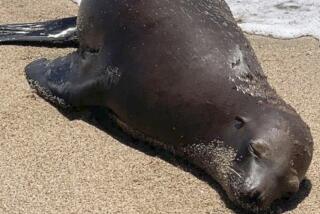Young mountain lion shot and killed by Napa homeowner days after it was collared for study
- Share via
A Napa family is facing criticism after shooting and killing a young mountain lion that was preying on their sheep.
The juvenile cat had already killed several animals in the family’s herd, and when it returned to the Sonoma Valley residence for another meal over the weekend, the family shot it, according to the California Department of Fish and Wildlife.
Investigators with the state agency determined the killing was justified, spokesman Peter Tira said Tuesday.
The mountain lion was about 13 months old and had recently left its mother, said Quinton Martins, director of the Audubon Canyon Ranch’s Living With Lions study, which aims to understand how humans can co-exist with the big cats.
Scientists had captured the cougar, known as P-15, and fitted it with a tracking collar five days before it was killed. The young mountain lion was the third being tracked since late 2016 to be killed by Sonoma Valley residents.
Tira said P-15 had a history of killing. On Feb. 3, Martins was contacted after the animal had preyed on some livestock. A herd’s owner agreed to have the big cat captured and collared instead of killed. The resident named P-15 “Jupiter,” according to a Facebook post by Audubon Canyon Ranch.
Mountain lion that attacked Yucca Valley homeowner’s livestock is killed by deputies »
Unlike the lions in the Santa Monica Mountains, which face the obstacle of deadly freeways and forced inbreeding, those in the Sonoma Valley are being killed by residents with unsecured livestock. And it has been a challenge for scientists who are working to understand the animals, Martins said.
“If they had secured their livestock, the mountain lion would not have been able to kill,” he said. “By killing them, they’re not able to contribute to the health of the mountain lion population.”
Tira said state law requires residents who wish to kill problem cats to apply for a state permit. It’s a long process that requires proof that an animal is threatening homeowners, their property or their livestock.
In the first two killings, residents had permits to kill the big cats, but the landowners had only a small number of livestock that were unprotected, not a commercial farm with large flocks, Martins said.
State law also allows residents to defend themselves if they are immediately threatened by the predators, he said.
Tira said the family who killed P-15 acted responsibly. They had reached out to the California Department of Fish and Wildlife after the first sheep killings, and they were considering building lion-proof enclosures.
“They were actively looking for a peaceful solution,” he said. “These folks did everything right.”
The wife of the man who killed P-15, Alejandra Calderon, told the Press Democrat that she feared for the safety of their three young children. She said she and her family are animal lovers.
“Of course, I totally understand people being upset, whoever was tracking these animals. But that was not our intention to just do it for the heck,” she said in the interview. “We would never do anything like that. We did it for safety.”
The state Department of Fish and Wildlife encourages people to protect their livestock and pets and offers resources on how to do so, Tira said.
“We don’t want to see lions dying unnecessarily,” he said.
Twitter: @r_valejandra
More to Read
Sign up for Essential California
The most important California stories and recommendations in your inbox every morning.
You may occasionally receive promotional content from the Los Angeles Times.











